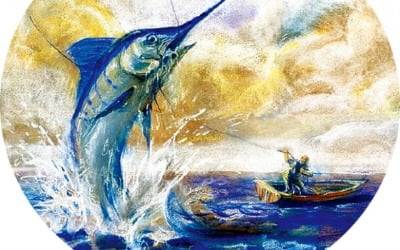#노인과 바다
-
학습 길잡이 기타
생략된 목적격 관계대명사를 눈여겨보세요
The old man was thin and gaunt with deep wrinkles in the back of his neck. The brown blotches of the benevolent skin cancer the sun brings from its reflection on the tropic sea were on his cheeks. The blotches ran well down the sides of his face and his hands had the deep-creased scars from handling heavy fish on the cords. But none of these scars were fresh. They were as old as erosions in a fishless desert. Everything about him was old except his eyes and they were the same colour as the sea and were cheerful and undefeated.[어니스트 헤밍웨이 <노인과 바다>]노인은 여위고 앙상한 데다가 목덜미에는 주름살이 깊게 파여 있었다. 그의 양볼에는 열대의 바다 위에서의 햇빛의 반사 때문에 가벼운 피부암의 갈색반점이 생겨 있었다. 이 반점은 얼굴 양면의 훨씬 아래까지 번져 있었고, 그의 양손은 줄곧 큰 고기를 밧줄로 다루기 때문에 깊은 상처가 있었다. 그 상처는 새로 생긴 것들이 아니었다. 어느 상처나 고기 없는 사막의 침식처럼 오랜 세월이 걸린 것이었다. 두 눈을 제외한 그의 모든 것이 늙어 있었다. 그러나 그의 두 눈은 바다와 같은 푸른 색깔이었고 활기가 있었고 패배를 몰랐다.‘어니스트 헤밍웨이’의 [노인과 바다(Old man and the sea)]를 설령 읽지 않았더라도, 이 소설의 제목을 들어보지 않은 학생은 거의 없을 것으로 생각합니다. 노벨문학상 수상작이기도 한 이 작품은 우리에게 많은 교훈과 큰 울림을 주는데, 의외로 생각보다 어려운 단어와 표현을 만날 수 있습니다. Words & Expressions우선 gaunt란 단어는 ‘여윈/수척한, 황량한’이란 뜻으로 be gaunt from hunger는 ‘굶어서 수척하다’라는 의미랍니다. 그리고 blotch는 ‘얼룩, 종기’ 등을 나타내는 단어라 She had come out in dark red blotches

